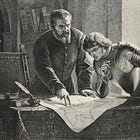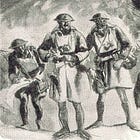In the spring of 1911, La Gazette de l’Armée (which, marvelous to say, means The Gazette of the Army) published, in four pieces, a remarkable article on the subject of war games of the type played by ‘our neighbors on the far side of the Rhine.’ The text that follows is a verbatim translation of the first part of this disquisition, one that, I hope, captures the ‘snarky yet serious’ tone of the original.
‘As long as there are rounds in our rifles, we will muddle through.’
Such is a slogan we hear too often, but means nothing.
When the bullets whistle, we won’t worry about getting our feet wet, or trampling crops. We will lose much of our ability to control subordinates. But … these difficulties will be replaced by others. We won’t want to take risks. It will be easier to get lost. We will have to do things that were too difficult to teach in training.
‘We will get more out of our men. They will become more attentive, more obedient.’
Not necessarily. Fatigue will impose limits. Men overtaxed by several days on campaign, poorly fed, short on sleep, bearing heavy burdens, will not do the difficult things that we ask them to do when double-timing near the barracks.
Attentive? A man stretched thin by fatigue? He can fall asleep in a hurricane (see the writings of Captain L.Z. Suloviev.)
Obedient? That’s what the regulations say. And, one understands that, in the storm, a man sticks to his leader, if he thinks of him as a savior, if he thinks that, he will follow. He will avoid avoidable losses, and will drive the enemy from his position … perhaps.
Yes … but … the ‘leader’, in the field, is not the man who wears insignia of rank, who cancels a man’s leave, who confines a man to the brig for a few days. These powers, already so fragile in time of peace, do nothing to stop a man when death is in the air.
In war, the authority of the leader comes from the confidence he inspires in his intellectual abilities and morale character. Men sense that he possesses the ability to make difficult decisions, that he knows what to do when the usual rules fail to apply. Men obey him, even when they don’t understand what he is thinking, just as, when a factory catches fire, the worker obeys the engineer who cries, ‘crush that pipe, break that line, knock down that support’.
We have not been able to resist the temptation to quote the strong words of a man who was taken from us too soon. But we have better things to do than demonstrate the necessity of preparing for war. Readers of la Gazette de l’Armée know well that, in war, ‘one does what one can to apply what he knows, and, in order to be able to do a little, one must not only know a lot, but know that well.’1
As for the conscience, the scale which uses weights which everyone makes for himself, it protects those who remain young at heart while walking the busy path of work.
Allow me to emphasize that, if this work is to yield good fruit, it must prepare us for war in much the same way that fencing practice prepares us for a duel. That is, it must be both a case study and a game.2
***The Germans have given the name of ‘war game’ to a kind of grill on which a victim is roasted for a certain number of hours. This is the Kriegspiel.
We will speak of it again, because it can, in a pinch, serve as a game.
You just have to not heat it too much and change the victim often. And then, as happens with a torture that the Turks declare delicious, when it begins, the Kriegspiel gives pleasant sensations and makes the brain do a salutary gymnastics.
But this is German gymnastics, good for an elite, fatal to the little ones. Why look so far?
Most of the games that are played around us can give us excellent indications - because, wherever men fight, whether with weapons, sticks, pawns or cards, there are principles that do not change. Among the games with various combinations, we could take chess — it is a game of scholars and rentiers. We prefer the fashionable game: bridge, and we will try, in a future article, to clarify this idea, apparently so paradoxical, namely that the game of bridge can give us the bases of our tactical instruction.
To be continued …
Source: Anonymous: ‘le Jeu de la Guerre’ la Gazette de l'Armée (20 April 1911)
For Further Reading:
The quotation comes from Ferdinand Foch Des Principes de la Guerre (Nancy: Berger-Levrault, 1906) page 5. As Foch was alive and well in 1911, I am not sure why the author would ascribe the quotation to ‘a man who was taken from us too soon’.
I use the term ‘case study’ to translate cas concret, which literally means ‘concrete case’.








So the Armée de Terre was playing cards while the Deutsches Heer was working thru map exercises and actual war games? That might explain the opening phases of WW I.
I have been meaning to play Kriegspiel with the international society, it looks very good. I do wish more of the scenarios were WW2 or later, but it makes things difficult